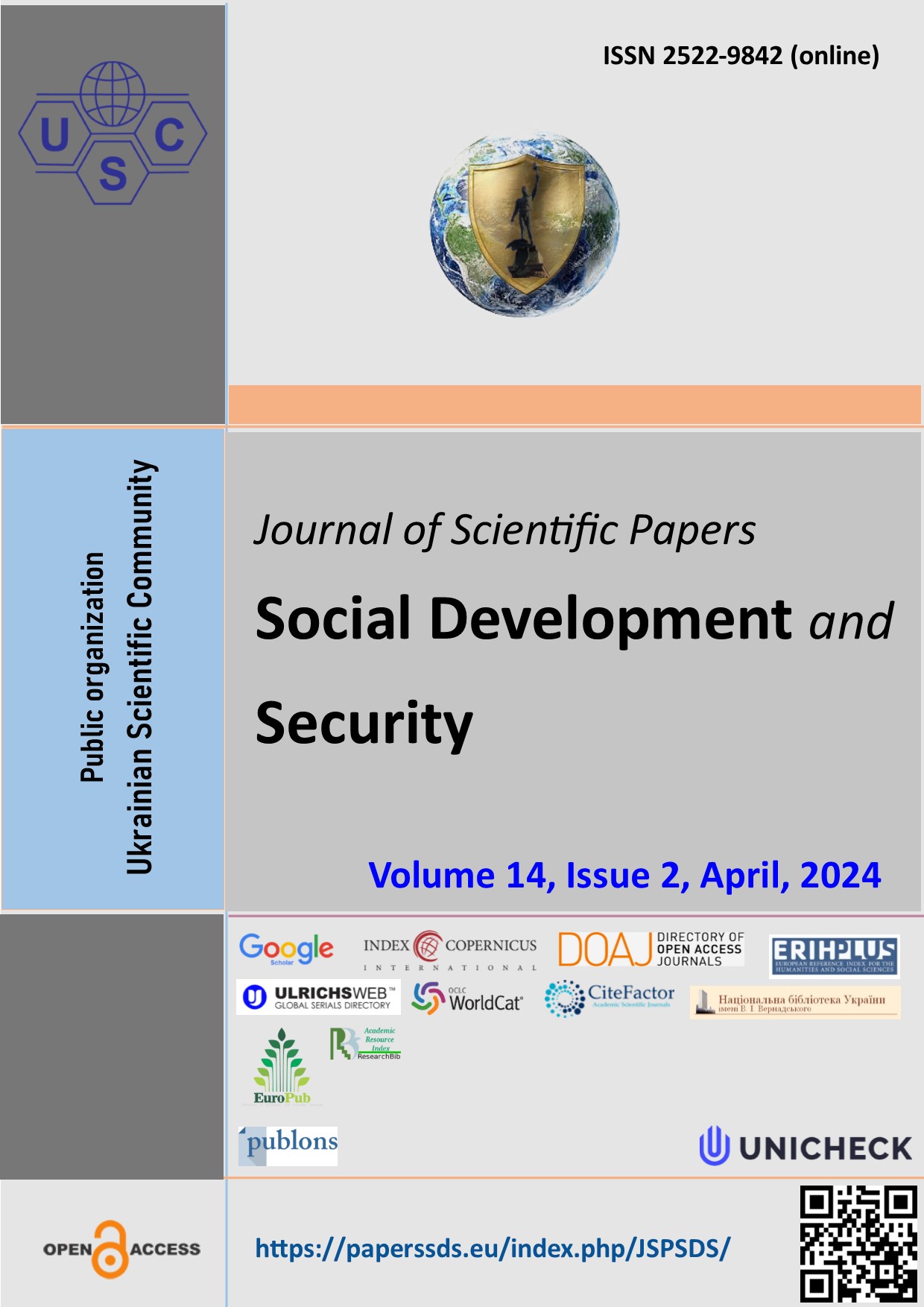Components of professional competence of a modern border guard officer
Abstract
Abstract:
The article provides a theoretical analysis of the concept of "professional competence" of modern border guard officers. It is determined that the professional competence of border guard officers is the ability of border guards to perform their duties in accordance with the current requirements. The purpose of the article is to conduct a theoretical analysis to clarify the components of "professional competence" of modern border guard officers and to define the essence of this concept in the context of ensuring national security of Ukraine. The results of the study: it has been found that the components of professional competence are: 1) professional (service) competence; 2) psychological competence; 3) pedagogical competence. The components of psychological competence are: the activity of the teacher to introduce innovations into their activities, the ability to analyse professional situations, reflexivity, the teacher's tendency to self-development, empathy. Theoretical significance of the study: the components of the professional competence of a modern border guard officer in the context of ensuring the national security of Ukraine have been interpreted for the first time. Practical significance of the study: the results obtained can be used in higher military educational institutions when teaching the following courses: "Moral and Psychological Support of Operational and Service Activities", "Psychotraining", "Psychology of Extreme Activities", "General Psychology with a Workshop". The originality of the study: the structure of professional competence of a modern border guard officer in the context of ensuring the national security of Ukraine has been supplemented. Future research will be devoted to the development of a programme for designing the professional competence of future border guard officers on the basis of problem-based learning in a higher military educational institution. Type of article: theoretical.
Downloads
References
Behh I. D. Model of a professional in the context of a modern socio-cultural situation. The theory and practice of social systems management. №3 (4). Kyiv, 2001. P. 57-62.
Bilyavets S. Ya. Theoretical and methodological bases of formation of professional competence of future border guard officers in the process of training of military special disciplines: monograph. Khmelnytskyi: Publishing House of NADPSU, 2018. 468 p.
Borovyk L.V. Formation of psychological and pedagogical competence of future border guards: theory and practice: monograph. Khmelnytskyi: Publishing House of NADPSU, 2018. 292 p.
Borovik L. V. Analysis of the criteria of psychological competence of officers of the State Border Guard Service of Ukraine. Educational and scientific support of the activity of law enforcement agencies and military formations of Ukraine: II All-Ukrainian. Sciences.- Practice. Conf. (November 20, 2009). 2009.№3. P.35.
Vintyuk Y. V. The Concept of Formation of Professional Competence of Future Psychologists in Higher Education Institutions. Young scientist. 2017. № 4 (44). P.351-355.
Gorbatko K.M. Criteria, indicators and levels of professional-psychological competence of future border guards. Collection of scientific papers of the National Academy of the State Border Guard Service of Ukraine. Series: pedagogical and psychological sciences / Chief. editor V. V. Rayko. Khmelnitsky: NADPSU Publishing House, 2013. №3 (68). 350 p.
Gorbatko K. M. Formation of psychological and pedagogical competence of future border guards in the process of professional training: diss. Ped. Sciences: 13.00.04. Khmelnytskyi: NAPSU, 2018. 249 p.
Grytsyna O. M. Development of psychological stability in heads of bodies of the state border protection of Ukraine: dissertation. Khmelnytskyi: Publishing House of NADPSU, 2018. 216 p.
Grishko-Dunaevskaya V. A. Features of subject-subject interaction in the process of studying a foreign language in higher military educational establishments: dissertation author's abstract for obtaining a scientific degree of candidate of psychological sciences. Khmelnitsky: NADPSU Publishing House, 2016. 20 p.
On the State Border Guard Service of Ukraine: Law of Ukraine, March 4, 2003.
Makarova O. Features of the process of professional identity of police officers at the stage of professional training. Collection of scientific papers of the National Academy of the State Border Guard Service of Ukraine.Series: psychological sciences / Chief. editor O. F. Volobuyeva. Khmelnytskyi: Publishing House of NADPSU, 2018. №3(11). 324 p.
Maksimenko S. D. Moral and psychological support of the frontier troops of Ukraine: textbook. Khmelnytskyi: NABGT Publishing House. 2001. 448 p.
Malyar T. O. Issue of raising the social and psychological competence of young officers of the State Border Guard Service of Ukraine. Collection of the scientific reaserches of the National Academy of the State Border Guard Service of Ukraine № 25. Khmelnitsky: NADPSU, 2003. Part II P.172-175.
Oleksiyenko B. M. Teacher of the Military Academy: a textbook. Khmelnitsky: ABGTU Publishing House. 1997. 84 p.
Oliynyk L. V. Professional competence of future liaison officers: psychological and pedagogical aspect. Collection of scientific works of the Military Institute of Taras Shevchenko National University of Kyiv. Kyiv: MIKNU, 2005. №1.P.166-171.
Potapchuk E. M. Military Psychology: Textbook. Khmelnitsky: Edition of NADPSU. 2003. 250 p.
Psychological dictionary / V. V. Sinyavsky, O. P. Sergienkova / Ed. N. A. Pobirchenko, Kyiv. 2007. 336 p.
Rubinstein L.S. Essentials of general psychology: a textbook. St. Petersburg: Piter. 2000.729 p.
Safin O. D. Topical problems of human factor usage in special conditions of activity: psychological aspect. Development of information society. Collective monograph in 10 volumes. Vol. 3. Legal and socio-psychological dimensions of the modern information society. - K.: University of Economics and Law KROK. 2015. 405 p.
Timchenko A. V. Psychological aspects of the condition, behavior and activity of people in extreme conditions and methods of their correction. Kharkiv. 1997. 284 p.
The Interpretive Dictionary of the English Language, Kyiv. 1993. 845 p.
Interpretive Dictionary of Modern Ukrainian, Kyiv. 2009. 760 p.
Bulletproof spirit: The first responder’s essential resourse for protecting and healing mind and heart / Dan Willis, Captain, La Mesa Police Department, New World Library, Novato, California, 2014, 230 p.
David W. Johnson, Roger T. Johnson, Karl A. Smith. Cooperative Learning Returns to College. Change, 1998.July / August. P. 27-35.
Spencer Kagan Cooperative Learning: Resources for Teachers. Inc.-San Clemente. 1994. 1(800). 800 p.
Levenko M. V. Professional competence of the teacher. Available from : http://klasnaocinka.com.ua/en/article/profesiina-kompetentnist-vchitelya.html / (accessed 03.02.2024).
Abstract views: 225 PDF Downloads: 152
Copyright (c) 2024 Artem Chornyi, Volodymyr Andrushko, Andrii Mostovy

This work is licensed under a Creative Commons Attribution 4.0 International License.
The authors agree with the following conditions:
1. Authors retain copyright and grant the journal right of first publication (Download agreement) with the work simultaneously licensed under a Creative Commons Attribution License that allows others to share the work with an acknowledgment of the work's authorship and initial publication in this journal.
2. Authors have the right to complete individual additional agreements for the non-exclusive spreading of the journal’s published version of the work (for example, to post work in the electronic repository of the institution or to publish it as part of a monograph), with the reference to the first publication of the work in this journal.
3. Journal’s politics allows and encourages the placement on the Internet (for example, in the repositories of institutions, personal websites, SSRN, ResearchGate, MPRA, SSOAR, etc.) manuscript of the work by the authors, before and during the process of viewing it by this journal, because it can lead to a productive research discussion and positively affect the efficiency and dynamics of citing the published work (see The Effect of Open Access).
















